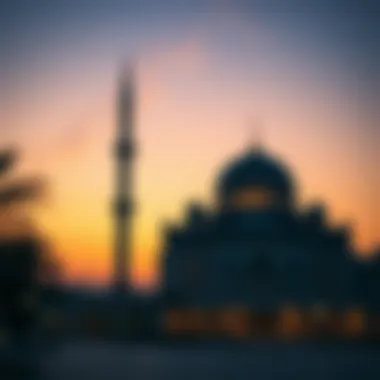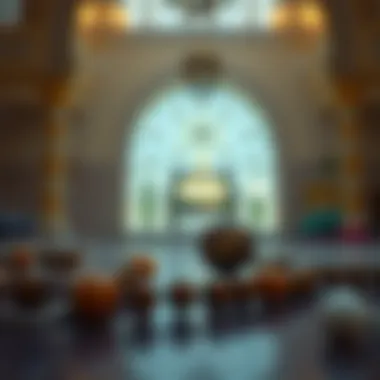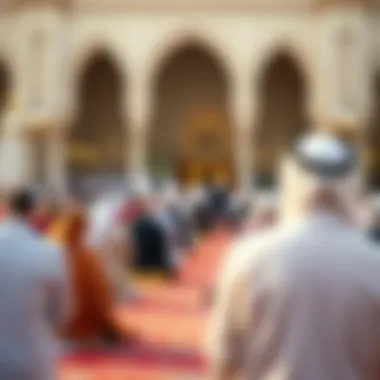Ramadan Prayer Timings in the UAE 2023 Guide


Intro
Ramadan is a time of reflection, fasting, and prayer for millions around the globe. In the United Arab Emirates, nearly every community comes alive during this holy month, blending tradition with modern-day living. For those who call the UAE home—whether locals or expatriates—understanding prayer timings is essential to effectively participate in the spiritual experience that Ramadan offers.
During this special month, the rhythm of daily life changes as people align their schedules around prayer. The five daily prayers, with the additional Taraweeh prayers after Isha, take on heightened significance. Grasping these timings enhances one's ability to engage fully in acts of worship and community bonding.
This article will shine a spotlight on prayer timings throughout the UAE for 2023. It will explore regional variations, delve into societal implications, and offer practical advice for integrating these sacred observances into daily routines. Through a comprehensive look, readers will garner insights that bridge cultural appreciation and religious commitment. As the sun sets and the calls for prayer echo across the vibrant cityscape, each person finds their way, reinforcing the sense of unity during this holy period.
Understanding Ramadan
Ramadan is not just another month in the Islamic calendar; it is a profound period filled with spiritual and communal significance. Understanding Ramadan means grasping the essence of its practice, the benefits it brings to individuals and communities, and how it shapes the cultural landscape, especially in the UAE. For those residing or visiting the UAE during this month, recognizing the importance of daily prayers and their timings becomes essential. This article aims to detail how prayer fits into the Ramadan experience, not only as a religious obligation but as a vital aspect of social interaction and cultural participation in Emirati life.
History and Importance
The roots of Ramadan trace back to the revelations received by the Prophet Muhammad over fourteen hundred years ago. It is during this month that the Qur'an was first unveiled, thus marking it with immense respect and reverence among Muslims worldwide. Historically, Ramadan was observed as a time to intensify worship and deepen one’s connection to faith. In the UAE, this month has also evolved into a period of generosity, where many engage in charitable acts, providing for the less fortunate.
Understanding the historical context aids in appreciating the gravity of Ramadan. It’s not merely about fasting; it is a tradition steeped in ancestry, signaling a time for reflection, gratitude, and a collective sense of belonging within the community.
Religious Significance
At its core, Ramadan is about spiritual growth. The act of fasting from dawn until sunset serves to purify the soul and encourages individuals to reflect on their personal lives and spiritual commitments. The five daily prayers, especially during Ramadan, involve more than routine; they are elevating moments that connect one with the divine.
Numerous traditions and teachings emphasize the elevated status of prayers during this month. Special prayers, known as Taraweeh, are offered at night, reinforcing the sense of community as people gather to worship together. The atmosphere in mosques tends to be electric with devotion and worship, and this collective experience fosters unity and fraternity among worshippers.
Cultural Practices in the UAE
In the UAE, Ramadan is celebrated with unique cultural practices that offer a glimpse into the heart of Emirati society. From the moment the moon is sighted, signaling the start of Ramadan, the entire nation gears up for a month of reflection and community spirit.
- Iftar Gatherings: The breaking of the fast at sunset, or Iftar, is often shared with family, friends, and even strangers. Hotels, mosques, and community centers organize these gatherings, reflecting the country’s hospitality and warmth.
- Charitable Actions: Many Emiratis feel a strong inclination to contribute to charitable causes during Ramadan, organizing food drives and community meals to feed the needy.
- Cultural Events: Cities like Abu Dhabi and Dubai host a slew of events, from art exhibitions to cultural showcases that celebrate Ramadan's essence, inviting people from all backgrounds to learn and engage.
The UAE showcases how Ramadan goes beyond religious obligations; it intertwines with contemporary lifestyle, emphasizing values of community, charity, and connection.
Ramadan offers not just an opportunity for spiritual renewal but also a chance to engage with the culture and traditions that make the UAE unique.
By understanding these elements, individuals can better appreciate their experiences during Ramadan, yielding deeper connections that resonate throughout the observance.
Prayer Times Overview
Understanding the prayer times during Ramadan is more than a mere scheduling routine; it serves as a cornerstone of the spiritual observance in the holy month. Each prayer, from the break of dawn to the late hours of the night, holds a distinct significance that shapes the daily life of Muslims in the UAE. For both residents and expatriates, awareness of these timings is pivotal in fostering a sense of community and spiritual connection.
The timing of prayers is not just about the act itself; it also encompasses the rhythm of the day for practicing Muslims. Throughout Ramadan, these prayer times give structure, breaking up the fasting hours and reminding individuals to pause, reflect, and engage with their faith. This is especially vital for those who may be unfamiliar with the local customs and practices, ensuring they can fully participate in this sacred tradition.
Key aspects to consider include:
- Local Variations: Each emirate has its own timing based on geographical location. Factors like sunrise and sunset can vary slightly across areas, making it essential for individuals to refer to localized prayer timetables.
- Cultural Enrichment: Knowledge of prayer times allows one to engage deeply with Ramadan’s cultural practices. Community gatherings often occur around these timings, fostering social bonds.
- Integration into Daily Life: For expatriates and new residents, understanding prayer times facilitates better integration into local customs, enriching their experience during Ramadan.


As the month progresses, the significance of these prayer timings evolves, serving as a reminder of the spiritual journey undertaken. To ensure a smooth observance, let’s delve deeper into the specific timings of each prayer, starting with Fajr, the dawn prayer.
Ramadan Prayer Timetable for
The Ramadan Prayer Timetable for 2023 stands as a vital roadmap for Muslims during this unique month of reflection, fasting, and spiritual growth. Understanding the prayer timings isn't just about knowing when each prayer occurs; it also enhances the communal aspect of worship and strengthens the connection to faith. As the days grow longer and the nights become more contemplative, aligning one's daily schedule with these sacred timings becomes essential.
As Muslims navigate their daily routines, the prayer timetable serves not only as a guideline but also as a reminder to incorporate spiritual practices into everyday life. Observing the designated times for prayer fosters unity among communities, providing an opportunity for individuals to gather in mosques or at home for communal prayers.
Additionally, for expatriates living in the UAE, the prayer timetable is a bridge to understanding cultural practices and adapting to local customs. By observing prayer times, expatriates can integrate themselves into the community, fostering goodwill and respect.
Timings by Emirates
Abu Dhabi
Abu Dhabi has a deeply rooted history intertwined with Islamic practices, making it a center for spiritual observance during Ramadan. The pray times here often reflect the first light of dawn, guiding the faithful to commence their day with spiritual intention.
The key characteristic of Abu Dhabi is its blend of modernity and tradition. The rich architectural styles of its mosques, like the Sheikh Zayed Grand Mosque, symbolize this duality. Its unique feature lies in the varied community activities organized around these prayer timings, enriching the collective experience. However, with busy markets and events concentrated around prayer times, traffic can become quite congested, which is something residents need to navigate.
Dubai
Dubai presents a fascinating contrast, with its breathtaking skyline next to rich cultural experiences. The prayer timings in Dubai are an integral part of the day, often respected by both locals and expatriates alike. Known for its vibrant atmosphere, Dubai offers a unique experience with more extensive options for communal prayers in its many mosques.
An essential characteristic of Dubai is its cosmopolitan nature. The city embraces diversity, creating a melting pot of cultural practices around prayer times. A significant unique aspect is the annual Ramadan Market, allowing for shopping alongside observing spiritual practices. However, the bustling pace can sometimes overshadow quieter moments of reflection, requiring individuals to maintain a delicate balance.
Sharjah
Sharjah stands as the cultural capital of the UAE, combining heritage with Islamic traditions during Ramadan. Here, prayer timings are followed with profound reverence, reflecting the city's dedication to maintaining cultural roots.
The key characteristic of Sharjah is its preservation of Islamic heritage. Mosques are often the focal points of community life, showcasing a unique feature of providing lectures and classes related to Ramadan prayers. This fostering of education is a beneficial aspect for Muslims aiming to deepen their understanding of their faith. On the flip side, the increase in community activities can lead to crowded prayer venues.
Ajman
Ajman embodies a more relaxed atmosphere, where prayer timings allow for personal contemplation, often in quieter settings. The local communities are tightly knit, making it easier to connect with neighbors during prayer times.
A notable characteristic is Ajman's accessibility, where local mosques are within walking distance for many residents. This offers a beneficial experience for those who prefer a more intimate setting for worship. The unique feature of Ajman lies in its serene environment, with fewer distractions, fostering focus during prayers. However, a downside could be the fewer activities organized during Ramadan compared to larger emirates.
Ras Al Khaimah
Ras Al Khaimah boasts a rich blend of tradition and modernity, reflected in its prayer times that are strictly observed across the emirate. Here, the timings are cherished by communities, promoting the values of patience and gratitude.
The key characteristic of Ras Al Khaimah is its natural landscape, which often influences the peaceful atmosphere during prayers. A unique feature is the tranquility around local mosques, providing a perfect backdrop for reflection and worship. However, like Ajman, the quieter nature of Ras Al Khaimah may lead to fewer large-scale communal gatherings.
Fujairah
Fujairah, on the eastern coast, is known for its mountainous terrain and proximity to the sea. The prayer timings here are adapted to fit the unique lifestyle and environment of its people.


This emirate’s key characteristic is its emphasis on community interactions. Events often include local feasts after evening prayers, allowing families to share meals together. A notable unique feature here is the harmony found between nature and spirituality, providing residents with a peaceful setting for their worship practices. A downside can be the limited public transport options, which may make attending some events more challenging for those without personal vehicles.
Umm Al-Quwain
Umm Al-Quwain reflects a more tranquil lifestyle, where prayer timings are thoughtfully integrated into the daily life of its residents. The communal practices during Ramadan forge a strong bond among neighbors.
The emirate's key characteristic is its emphasis on family and community, encouraging shared experiences around prayer times. The unique feature is the dedication to grassroots events, like communal iftars. While this sense of togetherness is inspiring, lesser-known public engagements may not attract as large a crowd as in other emirates.
Key Dates and Observances
Key dates during Ramadan illuminate the path for observant Muslims. The beginning of the holy month is determined by the sighting of the moon, and various celebrations such as Eid al-Fitr follow, marking the conclusion of Ramadan. Understanding these dates is pivotal not just for spiritual observance but also for community planning.
Important observances include the Laylat al-Qadr, the Night of Power, where prayers and worship are believed to be particularly fruitful. This night occurs during the last ten days of Ramadan, often prompting special nightly prayers in mosques.
"Embracing spiritual guidelines during Ramadan can amplify an individual's personal journey of faith, while simultaneously strengthening community bonds."
Recognizing these key dates enhances the communal spirit of Ramadan, allowing all residents, regardless of background, to participate more meaningfully in the celebrations.
Implications for the Community
When discussing the Implications for the Community during Ramadan, it is essential to recognize how this holy month influences the lives of residents and expatriates alike. The practices surrounding prayer and its timings shape not just individual behaviors but also collective community experiences. This section will delve into how Ramadan prayer timings affect daily routines, the workplace, educational settings, and the vital role mosques and community centers play throughout this sacred period.
Adaptation of Daily Routines
The onset of Ramadan necessitates a shift in daily routines for many individuals. For Muslims observing the fast, the day-to-day activities are restructured to align with the prayer schedule and fasting times. The early morning Fajr prayer marks the start of the fast, while the Maghrib prayer signals the end of it. As a result, people often wake up before dawn to consume their Suhoor, the pre-dawn meal.
This change doesn’t just affect meal timing; it extends to various facets of life. For instance, many people adjust their sleep schedules to compensate for late-night prayers and communal gatherings. It's not uncommon to find families engaging in Iftar—breaking the fast—together, fostering a sense of unity. This adaptation is particularly noticeable in urban areas, where the busy lifestyle might require workers to reconsider their work hours. Hence, businesses often show flexibility during Ramadan, providing employees with adjusted work schedules to accommodate the prayers and fasting requirements.
Impact on Work and Education
The month of Ramadan invariably creates a ripple effect in workplaces and educational institutions. For employees, the combination of fasting and prayer observance often leads to reduced energy levels. Many companies in the UAE acknowledge this by allowing flexible hours or a shortened workday, understanding the importance of maintaining productivity while respecting religious duties.
Schools also adjust their schedules. In many cases, schools start later or have modified hours to ensure that students can attend classes while still observing their fasts and prayers. Some institutions even incorporate lessons on Ramadan's cultural and religious significance, enriching students’ understanding of this period.
This mutual recognition between employers and employees during Ramadan showcases the UAE's commitment to cultural sensitivity, promoting a harmonious balance between work responsibilities and personal beliefs.
Role of Mosques and Community Centers
Mosques and community centers serve as the heart of communal life throughout Ramadan. They are not just places for prayer; they become hubs for community interaction and solidarity. During this month, mosques often organize Iftar meals, where congregants and visitors gather to break their fast together. This practice strengthens community ties and provides an opportunity for acquaintances and newcomers to connect.
Moreover, many mosques host special nightly prayers, known as Taraweeh, which draw large crowds. These gatherings serve spiritual needs, while also emphasizing the importance of community cohesion. Community centers often run programs aimed at educating expatriates about local customs and practices associated with Ramadan, further enhancing respect and understanding among diverse populations.
In summary, the implications of Ramadan prayer timings extend beyond mere observance. They reflect the adaptability of communities as they navigate daily life during this sacred observance, balancing individual spiritual needs with collective social responsibilities. By doing so, the UAE showcases its ability to integrate tradition with modern living, thus creating a unique environment for both locals and expatriates.
Guidance for Expatriates


Navigating life as an expatriate during Ramadan in the UAE can be a rich experience, but it comes with its unique challenges. Understanding and adapting to cultural norms, especially during this holy month, is crucial for building harmonious relationships within the community. The insights provided here are aimed to help expatriates find their feet easily during Ramadan, ensuring they can participate respectfully and fully in the observances while enjoying the local culture.
Navigating Cultural Differences
In the UAE, Ramadan is not just a religious observance; it's a significant part of the cultural fabric. For expatriates, recognizing some of the key differences in how Ramadan is observed compared to their home countries can aid in avoiding misunderstandings.
- Respect Decline in Activities: Many businesses adjust their hours during Ramadan. For example, you'll notice changes in shopping times and dining options. Restaurants may close until sunset, and nightlife may be quieter than usual.
- Fasting Awareness: While many Muslims fast, expatriates don't have to partake in this practice, but being respectful is paramount. Avoid eating or drinking in public during the daytime to show consideration for those who are observing the fast.
- Dress Code: Modesty is essential. As a general guideline, ensure that your clothing is respectful of local customs. This is particularly important during Ramadan.
Understanding these nuances can ease potential discomfort, allowing expatriates to engage in Ramadan’s spirit, enhancing their overall experience in the UAE.
Engaging with Local Customs
Participating in local customs during Ramadan opens doors to deeper connections with the community.
- Iftar Traditions: Attend an Iftar; the meal that breaks the fast is a communal event and often viewed as a guest’s way to connect with others. Sharing dishes such as dates and refreshing beverages like Qamar al-Din (apricot juice) is common.
- Charity and Community Service: Ramadan emphasizes compassion and giving. Engaging in charitable acts, such as donating to local food drives or volunteering at community centers, is a meaningful way to immerse oneself in local culture.
- Greetings and Well-wishes: Familiarize yourself with common greetings during this month. A simple "Ramadan Kareem" conveys respect and positivity.
Embracing these customs will not only enrich your experience but also foster goodwill within the community.
Support Networks for Newcomers
Finding community support is invaluable for expatriates navigating Ramadan’s unique atmosphere.
- Expatriate Groups: Social media platforms like Facebook have groups where newcomers can share experiences, get tips, and even arrange meet-ups to break the fast together.
"You are never alone, and there's always a friendly ear willing to listen or a hand willing to help."
- Community Centers and Mosques: Many mosques offer programs and events for expatriates during Ramadan. Attending these can provide insights into local religious practices while developing friendships.
- Cultural Workshops: Some organizations offer cultural awareness workshops focusing on Ramadan, teaching expatriates about the historical and cultural significance of the month, as well as etiquette and practices to enhance their understanding.
Establishing a support network not only comforts newcomers, but it also enriches the expatriate experience during this sacred period.
Culmination
The conclusion of this article serves as a significant reflection on the integral role of Ramadan prayer timings within the context of the UAE. This section stitches together the various themes discussed, emphasizing how these prayers frame the daily lives of Muslims during this holy month. Understanding prayer timings is not just a matter of adhering to a schedule; it also encapsulates cultural resonance and community bonding that permeates throughout the Emirates.
Reflection on the Ramadan Experience
Ramadan is far more than a month of fasting; it’s a tapestry woven with prayer, reflection, and community spirit. For many, each prayer signals a moment to pause, reflect, and reconnect with one's faith. The spiritual journey during this sacred time isn’t limited to personal piety but extends to communal observances and shared experiences among family and friends. This engagement solidifies the bonds of the community, making it crucial for both expatriates and locals to partake in these collective events. The call to prayer resonates not only in the hearts of those who observe but also captivates anyone lending an ear, reminding them of the community's rich cultural fabric.
The experience of Ramadan in the UAE is unique, as it blends deep-rooted traditions with modern practicality. The mosque bells ringing at Fajr, the quiet hum of Dhuhr, the collective breath during Asr, the joy as Maghrib stars appear, and the serene silence of Isha speak to the pulse of life here. Missing out on these experiences can diminish one’s engagement with the spirit of Ramadan. Therefore, understanding these prayer times is paramount. Far from being mere reminders, they serve as invitations to foster community and self-awareness during this blessed month.
Looking Ahead to Future Observances
As we consider future practices around Ramadan and its prayer timings, it’s essential to recognize the dynamic nature of cultural and religious observance. Each year, variations in the lunar calendar may shift the dates and timings, inviting both challenges and opportunities for adaptation. Expats and residents alike should anticipate these changes, planning ahead to ensure they can fully immerse themselves in the upcoming experiences.
Looking forward, there are several considerations that can enrich the observance of Ramadan. Creating awareness around specific prayer times, integrating technology like prayer apps, and fostering community events can enhance engagement. Additionally, building on relationships with local mosques can provide more guidance and insights that align with cultural customs. For those new to this experience, the future is ripe with chances to deepen both understanding and participation in the spiritual and communal dimensions of Ramadan.
Even as the years roll on, the essence of Ramadan remains unchanged: a time for reflection, community, and deep spiritual connection. As everyone embarks on this journey, it’s vital to commit to participating in the prayers and rituals that shape this experience, affirming the values that make Ramadan a revered time across cultures.
“Ramadan is a month of blessings, a month of giving, and a month of community, and its essence flourishes when we share its experiences together.”
For more insights on cultural practices and prayer timings, visit Wikipedia or check out the detailed resources on Britannica.











